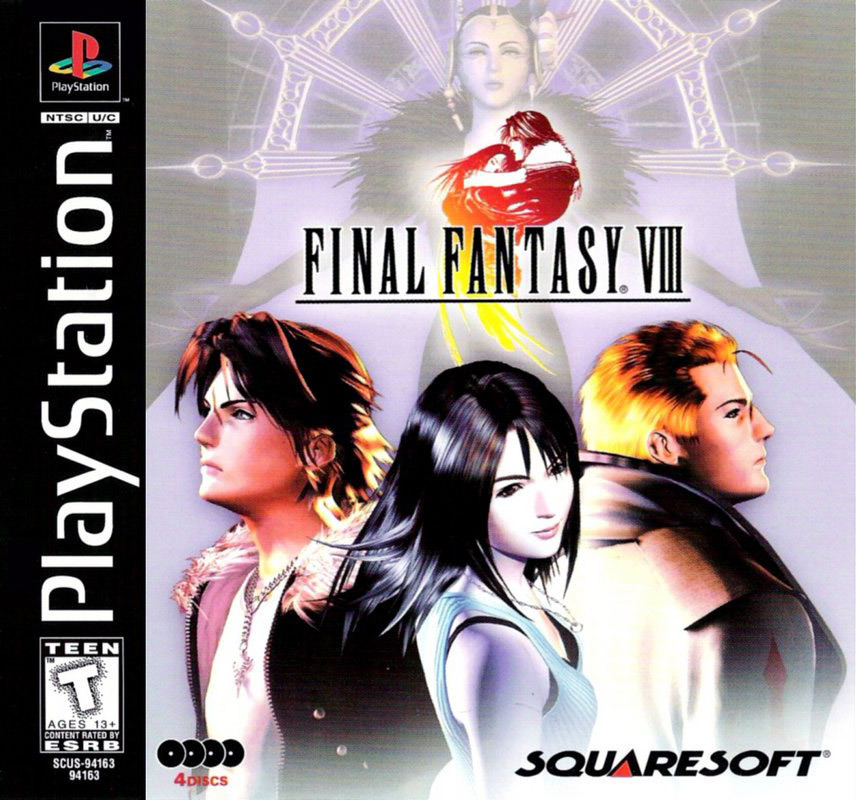
Final Fantasy VIII is a curious one.
You play a group of teens at a high-school-cum-military academy who spend their days planning prom dates, riding hoverboards and munching hot dogs at the school cafeteria. They’re training to become elite special forces, but have no idea their school is really a front for a millennia-long war against a time-travelling sorceress who wants to destroy all existence.
It gets… strange. You are mortally wounded and impaled in the chest at the end of Disc 1, then awake apparently unharmed. Everyone grew up together in an orphanage but forgot due to Plot Convenient Amnesia (discussed once and then forgotten). You fight a T-Rex in the school gym.

VIII can be maddeningly vague. Just who is Ultimecia, the sorceress from the future, and what does she really want? It’s never satisfyingly explained, nor how the sorceresses came about. There seems to be a link between her and your love interest Rinoa - with tantalising clues and strange allusions - but it’s a lacuna, an absence, like so many elements of FFVIII’s lore.
But a recent replay changed my mind. In fact: I now think VIII is the smartest and most self aware of the whole series. It has its faults and some bad writing in parts, but I think there’s a way of looking at FFVIII that makes sense out of the game’s weirdness.
I think that if you look at FF8 as a story about stories - a metastory - a structure falls into place. Like the game’s own time travel loop, this structure is a paradox, collapsing and uncollapsing on itself indefinintely. VIII tells a story about stories so dangerous, it has to abandon its own story in disgust.
I want to show you the real strangeness of Final Fantasy VIII.
The argument
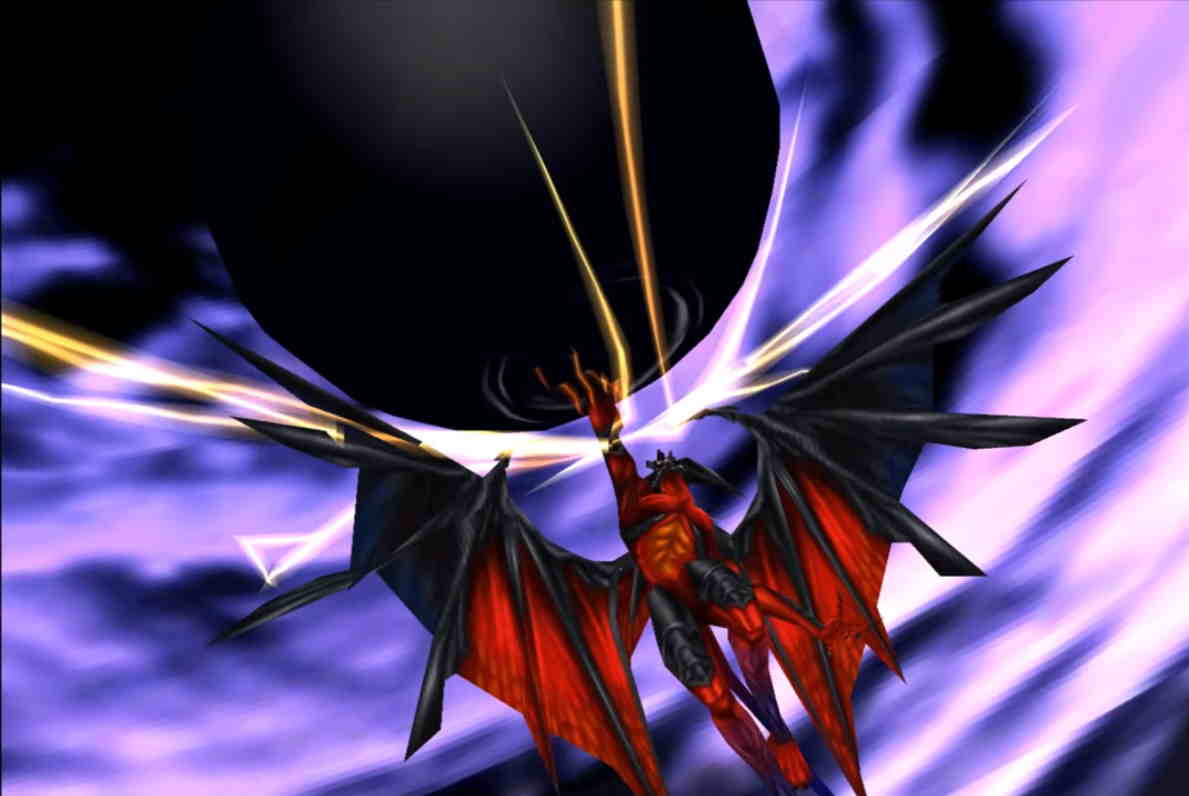
Here’s the idea: Final Fantasy VIII is about many things, but at the center of it are people so obsessed with history and mythology, and making sense of time, that they lose all perspective of the present. The infinite perspective of seeing across history warps people: it makes them justify atrocities; it steals from them their humanity; it makes them sacrifice everything that makes them themselves.
Ultimecia is so traumatised by the grief of her ancestors that through time-travel she retroactively commits genocide. SeeD in response is so fearful of Ultimecia’s wrath that it throws thousands of teenagers’ lives at any Sorceress who emerges, brainwashing cadets with memory-destroying magic powers. The result, of course, is that they cause the very oppression Ultimecia comes back to avenge. Seifer meanwhile is so obsessed with myth and movies that he plays his own fictional character, and loses himself in the process.
But this puts the game in a quandary. FF games love to tell grand stories about the origins of their worlds. VII has its Lifestream and the Ancients; IX had Terra and Garland. FF Tactics has its elaborately architected story of religious charlatans, corrupt priests and supernatural horror. What do you do, though, when the gist of your story, is that Stories on that scale are themselves evil and dangerous?
I think what happens, is that the game gets so revolted at the misuse of history and myth, it decides to stop trying to explain itself. Stop trying to fill in Ultimecia and her origins. Stop trying to explain Hyne or the origins of the Sorceresses. Instead it just focuses on two kids, Squall and Rinoa, making their own future.
And I think that makes sense, within the game’s internal logic. Because I want to go over just how much damage history does in FF8.
History and myth in FFVIII
Something I need to clarify is that - in FF8 at least - history and mythology are just two facets of the same thing. You could say both attempt to reduce time to a single, simpler, meaning.
For those fighting against the Sorceress, History is nothing but an endless war against Her, which in objective terms means a succession of women who inherit supernatural powers and are willing to use them politically.
For those fighting with the Sorceress, history is nothing but a Witch and her faithful Knight battling against all odds, protecting the descendants of Hyne, the great creator-god. Even if the Witch must lose, there is tragic beauty in facing the world alone.
However, FF8 treats mythology very sceptically. Consider the first (playable) scene of the game:

Squall is recovering from his fight with Seifer and wakes up in a medical bay. Dr Kadowaki asks him to focus his eyes.
What’s striking is its realism. This is Final Fantasy after all. Squall isn’t healed with a Curaga spell or a Megalixir; it’s all very conventional medicine.
This scene tells us four things: FF8’s world is like our own; technology is modern but restrained; magic if it exists is severely limited; and healing is done by doctors - not shamen. We’re in a recognisably modern world, which puts us outside of mythology, and by definition, on the outside of history.
Beyond that, though, VIII is coy to provide details. You’re a mercenary and your job is to complete missions to the letter, not get involved in politics. You’re encouraged to keep the lore of the world, and the interpretation of its events, very distant.
Myth is kept at arms’ length
When mythology does come up it’s… hazy. Only occasionally do you find characters willing to bring up how they think the world was created.
1 | Old Man to Grandchild (overheard): |
The Hyne story has the ring of a myth that’s been translated too many times to be intelligible, cribbed from the real world mythology of Atra-Hasis written 4000 years ago.
There are “Guardian Forces”, that resemble beings from religion and myth, but they’re a motley pantheon with no obvious origin. Depending on what fan theories you subscribe to, GFs like Griever might even be memes come to life, rather than beings that ever really existed.

By setting the game in the modern day and telling us to withhold our judgement, Final Fantasy VIII wants us to keep history and myth at arms’ length. Even when magic and monsters are introduced, it’s always behind a semi-scientific or sci-fi mechanic, like the Lunar Cry or electromagnetic radiation.
Perhaps it’s also why the focus of play is so much about stats and “junctioning” stats outside of battle, rather than performing superhuman feats in-battle: a game that’s sceptical of myth is just as sceptical of heroes, and underplays their power. Speaking of which -
Seifer is the discarded hero of Final Fantasy VIII
In Squall’s SeeD exam, your role is simple: follow a mission brief, don’t leave the assignment zone, don’t engage with civilians. You even get points docked from your exam result if you speak to NPCs. What the Dukedom of Dollet is, and what Galbadia want with their broadcast station, is none of our concern. We’re military subcontractors, not heroes.
Except… we _do_ have a hero on the team: Seifer Almasy. He tells us himself - and he seems to be the only person who gives a shit about what Galbadia are up to in Dollet.
Seifer carries the same weapon as Squall, with the same R1-for-bonus-damage gimmick. He has unique “limit break” conditions and his “posse” of Raijin and Fujin give him a party of three - just like your traditional Final Fantasy protagonist.
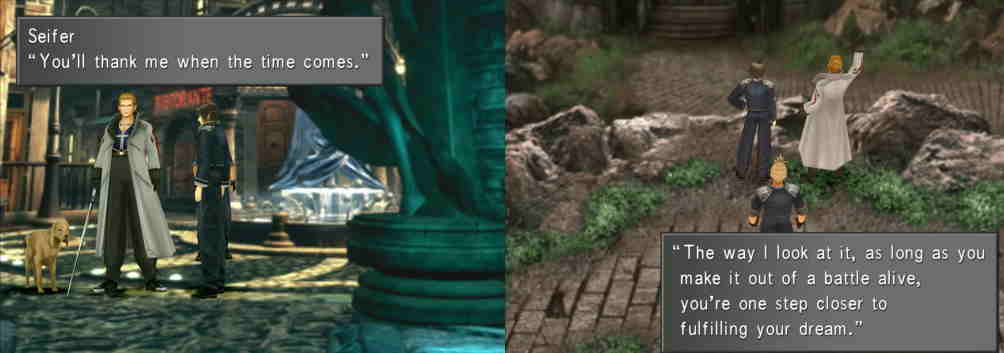
But Seifer is punished severely for his heroism.
On return from Dollet, he’s the object of utter contempt from Quistis and Xu - because Seifer stepping above and beyond represents a loss of earnings for SeeD. They’d rather the Galbadians run riot and burn Dollet to the ground: it’s good for business.
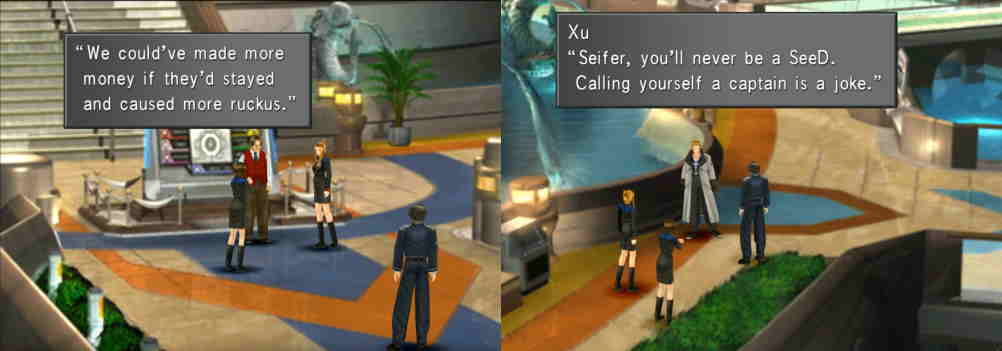
But Seifer is irrepressible: when he abducts President Deling in Timber, it’s because he’s outraged your team of three junior SeeDs were sent on a suicide mission:
1 | Quistis: |
Seifer’s problem, though is that he’s too self aware. He’s theatrical, egotistical, completely obsessed with books and movies. He quotes the Sorceress’ Knight at length to Squall and he holds his gunblade exactly like Laguna does in the Sorceress’ Knight movie:

Seifer’s fiction-obsession makes him live like a protagonist, fighting increasingly implausible odds. And boy, it costs him everything. Not just his humiliating defeats, but his values, his dignity, his selfhood.
On Disc 2 he taunts your party for fighting like monsters, a swarm of three against one. By Lunatic Pandora, though? He leaves any code of honour behind as he seizes Rinoa off-screen and sacrifices her to the monstrous Adel.
His grand, theatrical coat is by then worn and ragged; his slick-backed hair greasy and unkempt. Raijin and Fujin no longer recognise him. He’s become nothing, literally a Cipher in someone else’s story.
Violence begets violence
One of the things that always bothered me about FFVIII was the void where its villain is. I was used to Final Fantasy games with grand, bombastic, larger than life villains like Kefka, Sephiroth or Kuja. Ultimecia by comparison has very little screen presence.
I counted, and excluding what she says through Edea, she only directly speaks about eight lines across the whole game. Yet she’s the ultimate cause of the entire Time Compression plot. Why she wants to do it is unclear, and what it even means to compress time, is a very abstract threat.
Myth becomes history
Well, if we want to understand Ultimecia, we should start with what she says whilst controlling Sorceress Edea - these are her first lines in-game, if we include possessions:
1 | Edea: |
You probably know already that Ultimecia is going back in time to enact revenge for the oppression she’s suffered across history. But take another look. She’s very focused on fantasy and reality: the fantasy of the evil sorceress; the reality that’s unfolding; the threat to live that fantasy after all.
Ultimecia is specifically punishing people for mythology by making their myths real. She turns statues of mythic monsters into living ones and lets them loose on the crowd.

It’s easy to read Ultimecia as a garden-variety megalomaniac, but I see her as a force of History. She lives to grieve the past, and even the parts of history that weren’t true, she’ll go back in time to make real retrospectively.
History becomes myth
Ultimecia is obsessed with history. Why does a woman 2000 years in the future live in a Renaissance-style castle, replete with sixteenth-century style portraiture? Even the castle soundtrack is a Baroque ensemble of organs and harpsicords, a pastiche of 17th century music:
Compressing time - making all moments be experienced at once - is just another facet of that. Because that’s essentially what History, when it runs out control, really does: by “over-matching” patterns across time, it “compresses” them into a simpler narrative. Everything becomes About The Time War, and nothing else has real meaning.
Once you become obsessed enough with a historical narrative, you’re living Time Compression already: experiencing the same meanings and emotions over and over. All joy becomes empty when you know only grief for the inevitable future; people and places just become interchangable soldiers on the forever battlefield. There’s no meaning to anything, just war.

Eventually Ultimecia’s grief becomes literal as she merges her body with a monstrous, man-eating being called The Griever. Once that’s destroyed, she reveals her real form, whose head is just an empty void cradling a brilliant golden light. To me it always resembled a solitary candle in the blackness, a symbol of memorial to everything Ultimecia has lost, the ultimate sum of what’s really inside her.

Begets violence begets
Enough on Ulti. Let’s talk about SeeD for a moment. I think they’re far more morally grey than first appears.
Let’s review: to fight Ultimecia, Cid Kramer converted an orphanage into an elite paramilitary academy. He locates orphans, as well as displaced, vulnerable and “troubled” children, and he trains them up as soldiers, released into battle at age 15. To increase their power, he introduces these children to Guardian Forces. What he doesn’t disclose is that GFs demand a sacrifice for their power, by replacing memories in their hosts’ heads.
Children who grew up together greet one another as strangers. Garden guidelines discourage forming relationships. SeeDs don’t have friends, just colleagues, and they’re willing to fight former compatriots to the death if a contract demands it.

If you can’t remember anything, and you can never form friendships or relationships, only fight, I have to question - just how different is that existence really from Time Compression? If your life is endless battle against the Sorceress with no friends, no connections, and no personal history, are you really doing that much better than what Ultimecia has in store for you?
At the end of history, all that was left of Ultimecia’s was a glowing orb, a dying light of memory and grief. So what was left in Squall’s head after ten years of SeeD brainwashing and repression?
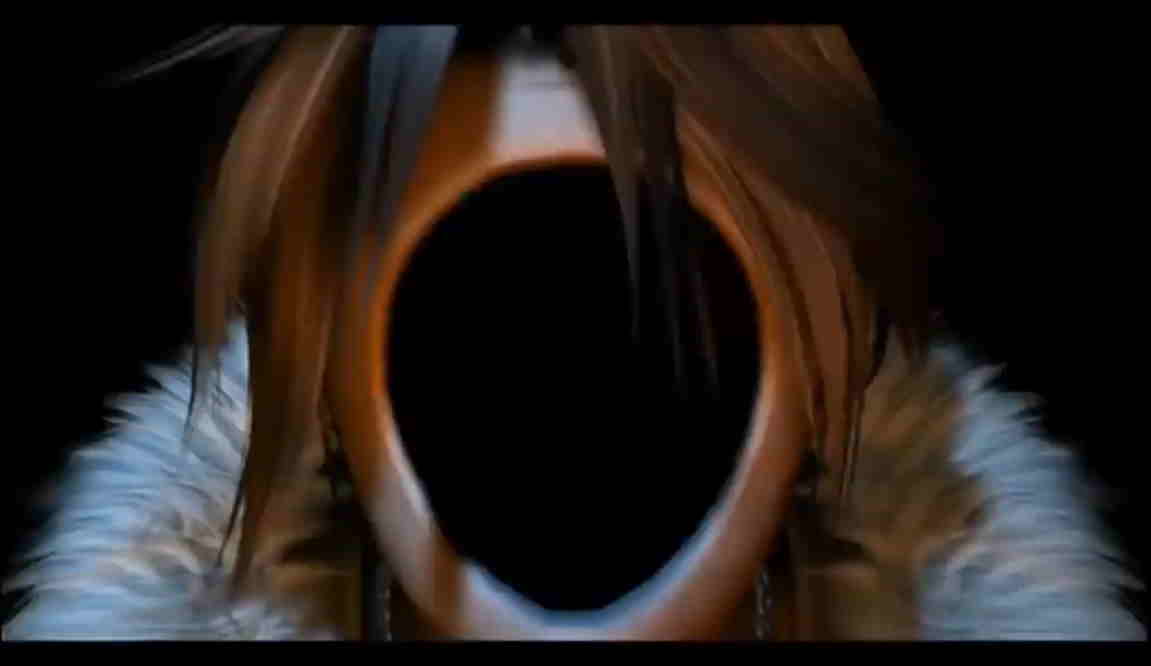
And let’s not forget how many SeeDs - mostly teens - die in this millenia-long war against the Sorceress. FF8 has a high-school setting to remind you that these people are kids. They talk about love, exploration and romance, because they are young adults with a lifetime of possibility ahead of them. These are the people Cid Kramer sends on suicide missions against Galbadia, because legend has it that a trio of SeeDs eventually win. It’s horrific.
Child sacrifice in Final Fantasy games
There’s a bigger theme I want to strike at, that stretches across other Final Fantasies. I think a lot of FF games in the late-90s era use child (or teen) sacrifice as a shorthand for civilisations that are fundamentally sick.
IX was probably the most overt about this: Vivi Orienteur and the Black Mages are beings manufactured to die young. IX’s lore is about an ancient planet of infertile immortals, the Terrans, consuming the life energy of younger planets in a bid to keep their ancient civilisation alive.

X continues the idea with Summoners: teenagers who volunteer for a dangerous pilgrimage to fight a being called Sin - that they can only subdue by sacrificing their lives. This is a fraud, however, perpetuated by the elderly and undead priests of Yevon.
These games have societies that have stopped being able to replicate themselves, and are eating their own young to keep going. It’s grotesque and intuitively unsustainable.
In Final Fantasy VII the crisis is all-pervasive. The world is controlled by the dystopian Shinra Electric Company., whose reactors gobble up the very “lifestream” that’s required to conceive new life.
FFVII’s society is sacrificing the young as a literal power source. Everywhere we go in VII’s world, youths are leaving to go work in the city, whilst their villages slowly die. Shinra’s armed force SOLDIER recruits teenagers aged 14, and subjects many of these kids to human experimentation, with brutal results:
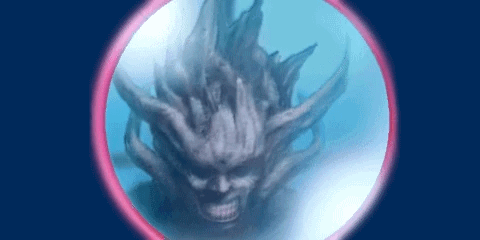
In FFVIII, meanwhile, kids are chewed up by the war machine on both sides. SeeD seeks out vulnerable children to turn into young soldiers. Meanwhile Sorceresses like Adel scour the land kidnapping little girls who might make successors.
So I don’t think we can excuse how SeeD operates as just a bit of a plot contradiction, because the theme crops up so many times in FF to be less than deliberate. SeeD might be better than Ultimecia’s tyranny, but the sacrifices they make are on a similar level of atrocity - and end up triggering Ultimecia’s revenge anyway.
And it largely happens because Cid Kramer’s obsession with history that hasn’t even happened leads him to decide that the ends justify the means.
Squall
Squall’s arc cuts through this endless cycle of revenge and war.
For Squall, becoming part of the past doesn’t mean becoming a legend, like it does for Seifer. It means losing control of your story and becoming part of someone else’s narrative - that’s what really freaks him out about death:
1 | Zell: |

As Squall grows through the story, his journey is to let go of his childhood trauma and embrace the possiblity of new friends and relationships. He stops caring about any narrative larger than that. Fighting Ultimecia is a faraway second to finding Rinoa:
1 | Zell: |
Whilst the gang go on about All Elusive Time Kompression, Squall Lionheart couldn’t give a fig. He only knows one thing:
1 | Squall: |
In the end, Squall doesn’t care about the binary of Knights versus SeeDs. He’s indifferent to history and contemptuous of plot. Falling in love with Rinoa offers him a future that sits outside the endless Sorceress War.
Abandoning History means letting go of Lore
So the future Squall cares about - one with Rinoa - is a timeline that isn’t bound within the Ultimecia time loop: it’s not part of the present day nor the final battle of SeeD. It’s also completely outside the scope of the game’s plot - this is an important idea, and we’ll come back to it.
Squall’s not the only one indifferent to the Sorceress War or even FF8 lore itself. Doctor Odine, VIII’s Einstein-figure and lore-explainer, positively can’t be bothered:
1 | Doc Odine: |
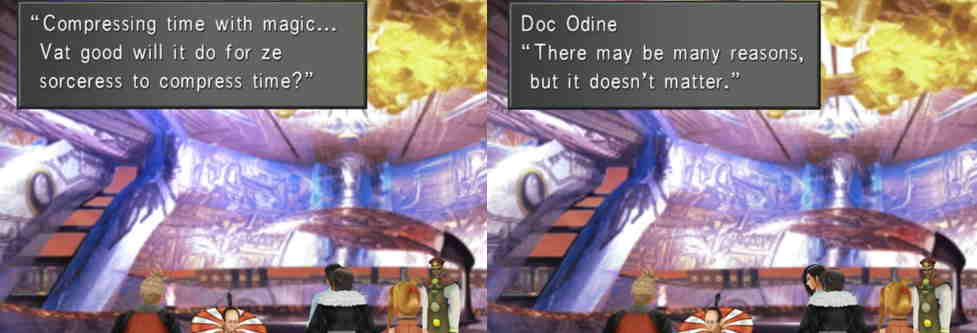
This is our one opportunity to learn the truth about what Ultimecia truly wants. And it doesn’t matter.
I used to rage at this scene! How could Square leave this completely ambiguous? How could they refuse me the neat explanation that tied everything together, like I had in all the other FF games? With no explanation beyond power itself it just seemed like pointless nihilism.
Now I feel differently. Too many characters in Final Fantasy VIII want their equivalent of an Odine-brand explanation: A single sentence that summarises the history of the FF8 world, nice and pat. A single sentence that draws a battle line in an endless war between side A and side B. I did too.
But getting that sentence, getting that explanation, is Time Compression. Reducing everything to a single experience, a single meaning. Nothing else meaningfully matters in that worldview. No space for love, hope, or anything outside endless war.
Doing that is as nihilistic as anything Ultimecia does. I am Ultimecia. Time shall compress… All existence denied. Grief and grief alone motivates her to reduce all existence to her own unquenchable anger and loss, perpetuating itself over the centuries. If Squall had taken the SeeD Prophecy too seriously, he could have accidentally done the same.
History is the real villain of Final Fantasy VIII and the game wants no part of it. Odine could have been written to fob us off with a simple explanation, about Ultimecia wanting absolute power or whatever. No. Instead he tells us that it truly isn’t important.
We should take him at his word. None of the lore about Hyne or Griever or the Guardian Forces goes anywhere - because the game wants us to move onto a different story.
Re-watching the credits
I want you to have another look at the final scenes of Final Fantasy VIII:

It’s a camcorder movie, of all of Squall’s friends, celebrating in the Garden. Zell is munching his beloved hot dogs. Quistis is finally relaxed and happy. Selphie and Irvine are reconnecting after years split apart. Even Edea and Cid are remarried. Everyone is in good spirits, but where is Squall?
Rinoa turns to the camera, smiles, and it’s obvious: Squall’s behind the camera, filming a new story of his own.
